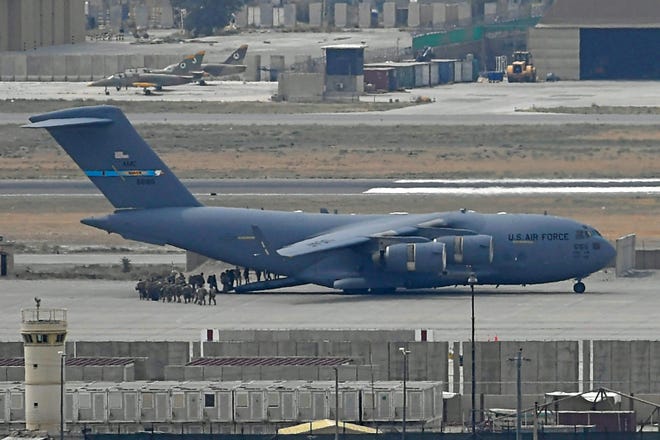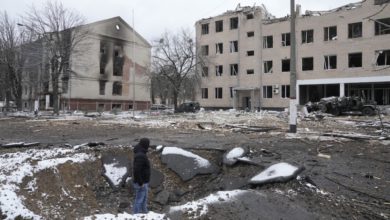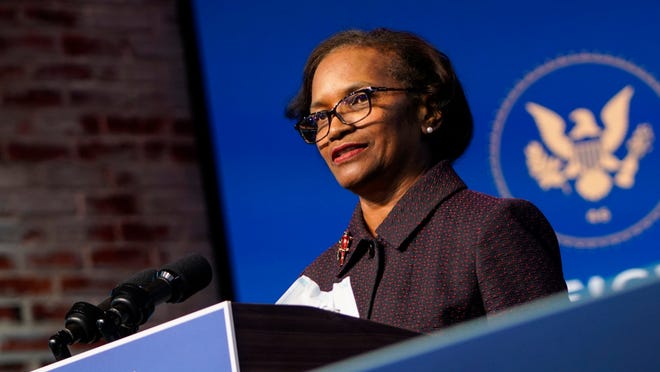
WASHINGTON — The nation's top military leaders faced lawmakers on Capitol Hill on Tuesday in a hearing touching on some of the most contentious national security challenges facing the country.
Joint Chiefs of Staff Chairman Mark Milley, Defense Secretary Lloyd Austin and U.S. Central Command Gen. Frank McKenzie testified before the Senate Armed Services Committee on Tuesday and will return to the House Armed Services Committee on Wednesday.
The trio is being grilled on their handling of the U.S. withdrawal from Afghanistan and, in Milley's case, reports that he may have circumvented his chain of command in sending reassurances to his Chinese counterpart.
The Pentagon officials repeatedly refused to reveal their private conversations with President Joe Biden on the Afghanistan war, but stated in their opinions that some U.S. forces should have been left in Afghanistan.
The hearing's afternoon session is going on now. Watch it here.
McKenzie: we ‘reserve the right’ to go after targets in Afghanistan
In response to a question from Sen. Tommy Tuberville, R-Ala. about the future of U.S. military involvement in Afghanistan, Gen. McKenzie said the U.S. reserves “the right to go in after ISIS and al-Qaeda targets as they present themselves.”
“We've been very clear on that,” McKenzie said. “It will not be easy to do that. It will be possible to do that.”
Defense Secretary Austin added that returning to Afghanistan is not “preordained.”
“We recognize that transnational terrorists will migrate towards ungoverned spaces,” he said. “We also are committed to not allowing al-Qaeda to regenerate and be able to export terror from Afghanistan to the United States of America. And we'll remain laser-focused on that going forward. And we'll do everything within our power to make sure that that doesn't happen.”
-- Chelsey Cox
White House defends Biden’s ABC interview, says he did not mislead on Afghanistan advice
White House press secretary Jen Psaki rejected assertions Tuesday that President Joe Biden misled the public last month when he told ABC’s George Stephanopoulos that no military leaders advised him to keep 2,500 troops in Afghanistan.
Psaki said Biden heard a “range of viewpoints” from his national security team and concluded after a “risk assessment” that keeping troops in Afghanistan would have resulted in the deployment of additional soldiers, war with the Taliban and more U.S. causalities. Biden withdrew troops before a self-imposed Aug. 31 deadline.
“In any scenario, he’s not looking for a bunch of ‘yes’ men and women,” Psaki said. “If there’s conflicting advice given, by necessity, some people’s advice will not be taken.”
Psaki’s defense came after Gen. Kenneth “Frank” McKenzie, the commander of the U.S Central Command, and Gen. Mark Milley, chairman of the Joint Chief of Staff, told senators Tuesday they recommended earlier this year that the U.S. keep 2,500 troops in Afghanistan.
That contradicted Biden’s comments in an Aug. 19 interview with ABC. Stephanopoulos asked the president, “So no one told -- your military advisors did not tell you, ‘No, we should just keep 2,500 troops. It's been a stable situation for the last several years. We can do that. We can continue to do that’”
Biden responded, “No. No one said that to me that I can recall.”
Psaki said the transcript has been “short-handed” in media reports, noting that in the same exchange Biden earlier said military advisors were “split” on whether 2,500 troops should remain in Afghanistan.
“I think that’s a pretty key part of that phrasing,” Psaki said.
-- Joey Garrison
McKenzie: 'No way' to keep Bagram air base open
Sen. Jacky Rosen, D-Nev asked Gen. Frank McKenzie about the possibility of keeping Bagram air base open to aid in evacuation efforts.
“It was not feasible to hold Bagram airport,” McKenzie said. “There was no way we were going to be able to keep Bagram and go to effective zero in Afghanistan.”
Once U.S. forces were fewer than 2,500 people in Afghanistan, the general said, the military lost the ability to hold the air base.
“It was inevitable we were gonna have to come out of Bagram because we ended up – in late June, early July – with 650 Marines and soldiers in the country. It was not feasible to hold Bagram under those circumstances,” McKenzie said.
– Chelsey Cox
Staying past Aug. 31 presented greater risk to U.S. troops, American citizens
Gen. Mark Milley told Sen. Angus King, I-Va., that risks to the U.S. military and remaining American citizens in Afghanistan “was going to go to extremely high beginning in September” if military forces remained past the Aug. 31 deadline.
Later in the hearing, Milley told Sen. Elizabeth Warren, D-Mass., that casualties to U.S. forces would have been a “near certainty.”
The Joint Chiefs chairman estimated U.S. forces would have to go to war with the Taliban on the first of September.
“We would have had to clear Kabul” of 6,000 Taliban at 56 checkpoints, Milley said. “We’d have to re-seize Bagram and the 30 miles of road between Bagram and Kabul. That would have taken a significant amount of force.”
'The operations would have resulted in “significant amounts of killed and wounded” and an increased risk to American citizens, the general said.
– Chelsey Cox
Senator calls for independent investigation into Afghanistan war
Sen. Tammy Duckworth raised the possibility of an independent investigation into the American 20-year war in Afghanistan.
“I will always cooperate with my oversight committee,” Defense Secretary Lloyd Austin said, when asked by Sen. Maizy Hirono, D-Hawaii, on whether he’d agree to such a panel.
There are no other Defense Department internal audits being conducted at this time on the Afghanistan war.
Austin told Sen. Kirsten Gillibrand, D-N.Y., there is an after action review underway on the evacuation of the nation, but nothing that reviews the entirety of the war.
– Katie Wadington
Collapse of Afghan military and government are completely linked, McKenzie explains
In response to a question from Sen. Tim Kaine, D-Va. about the speed and collapse of both civilian and military government, Gen. Frank McKenzie said the two are “completely linked.”
The dissolution of Afghan military forces during the U.S. military withdrawal from Afghanistan came down “will to combat and fighting spirit,” exacerbated by the Doha agreement – the February agreement for bringing peace to Afghanistan – which they believed was forced upon them, McKenzie told Kaine.
“And when (the Afghan) president leaves suddenly in the middle of a campaign for the Capitol. I think that finishes any chance at all, you might have had of making a stand,” he said. “I think all of those came together at a very powerful negative synergy, towards the end.”
Afghan President Ashraf Ghani fled Kabul on Aug. 15, as the Taliban moved into the nation's capital. He's believed to be in United Arab Emirates.
– Chelsey Cox
All equipment demilitarized in Afghanistan, Austin assures senators
Sen. Joe Manchin, D-W.Va., said it left him “absolutely insane” to see images of the Taliban wearing and using U.S. equipment.
Defense Secretary Lloyd Austin replied to Manchin, referring to former CentCom leader Gen. Austin Miller: “All of the equipment that we had, that we used was retrograded by Gen. Miller as a part of the drawdown.”
“The equipment that the Afghan security forces had as the Taliban took over, is the equipment that you see,” Austin added.
Austin said he asked Gen. Frank McKenzie to demilitarize helicopters that were left on the airfield in Afghanistan “so that they couldn't ever be used again.”

“We retrograded all of our equipment that we were supposed to retrograde as we drew down,” Austin said.
Manchin told Austin, “I would hope that God would bless America to have the intelligence not to repeat what we can continually see doesn't work.”
– Mabinty Quarshie
More:What happened to US military equipment left behind in Afghanistan?
Austin: Gen. Austin Miller and the military planned the evacuation
During the hearing, Sen. Elizabeth Warren, D-Mass., asked Defense Secretary Lloyd Austin on the Afghanistan withdrawal, “Once President Biden made the decision to have U.S. forces leave the country, who designed the evacuation?”
Austin said he would not comment on private conversations he had with the president. However, Austin said in Biden’s “calculus this was not risk-free. And the Taliban, as we said earlier in this hearing, were committed to recommencing their operations against our forces.”
“Once he made the decision, then of course from a military perspective, in terms of the retrograde of the people and the equipment, that planning was done by Central Command. And certainly principally by Gen. Miller,” Austin continued, referring to Gen. Austin Miller, former leader of U.S Central Command.
More:'Fatally flawed': Top Senate Democrat blasts Biden administration's Afghanistan withdrawal
“Very detailed planning, and then we came back and briefed the entire interagency on the details of that plan.”
Austin also said that Biden followed his advice executing the evacuation plan and gave him the resources he needed in response to questioning from Warren.
– Mabinty Quarshie

Austin statement at odds with Biden's on troop recommendation
Defense Secretary Lloyd Austin told Sen. Tom Cotton, R-Ark., that President Joe Biden was briefed on keeping a minimum troop presence in the country, in the 2,500 range.
Austin said the “input was received by the president” and that he and Gen. Mark Milley had endorsed the recommendation.
Austin added that Biden is "an honest and forthright man” but declined to outline whether his narrative contradicted the president’s.
During an Aug. 31 interview with ABC News, Biden denied that advisers had ever recommended such a move.
“No one said that to me that I can recall,” the president said.
– Matthew Brown
McKenzie recommended 2,500 troops remain in Afghanistan
Ranking member Sen. Inhofe, R-Okla., asked Gen. Frank McKenzie if he agreed with former commander of U.S. forces in Afghanistan Gen. Scott Miller’s recommendations to President Joe Biden to leave a few thousand troops in Afghanistan.
“I recommended that we maintain 2,500 troops in Afghanistan. And I also recommended earlier in the fall of 2020 that we will maintain 4,500. At that time, those are my personal views,” McKenzie said.
“I also have a view that the withdrawal of those forces would lead inevitably to the collapse of the Afghan military forces, and eventually the Afghan government.”
Milley agreed with the recommendation of 2,500 troops in Afghanistan.
When Inhofe asked if Biden heard the recommendations, McKenzie said he was present during the discussions and was “confident that the president heard all the recommendations and listened to him very thoughtfully.”
– Mabinty Quarshie

Milley explains calls with Chinese, said his job was to 'deescalate'
Joint Chiefs of Staff Chair Gen. Mark Milley, the highest-ranking officer in the military, defended himself against personal accusations that he’d acted improperly in calls with his Chinese counterpart, Gen. Li Zuocheng of the People’s Liberation Army.
Milley largely confirmed the account in a recent book by Washington Post reporters that he’d spoken with Li to reassure him that the U.S. would not launch a nuclear strike against Beijing.
More:Trump, Republicans call Gen. Mark Milley 'treasonous' for calls with China
Milley said the calls were “generated by concerning intelligence that caused us to believe the Chinese were anticipating an attack by the United States” and he was told to diffuse the concerns.
He said the calls were in full communication with the Trump administration’s Defense Department and that he “routinely calls” his Chinese counterparts, adding that such calls are “critical for the security of the United States” and “to prevent war with great powers.”
“My loyalty to this nation, its people and the Constitution of the United States has not changed,” Milley said.
“I am certain that that President Trump did not intend to attack the Chinese,” he said. “My task at that time was to deescalate.”
“By law, I am not in the chain of command and I know that,” Milley said. “But I am in the chain of communication.
“I firmly believe civilian control of the military is a bedrock principle of the republic.”
– Matthew Brown
Milley addresses Afghanistan collapse
Milley defended the military’s operations during the fall of Kabul and subsequent U.S. evacuation while also explaining his own conduct in calls with his Chinese counterparts in 2020.
“We provided a broad range of options,” to President Joe Biden, Milley said, explaining how the military shifted its mission to drawing down
“It is clear, it is obvious the war in Afghanistan did not end in the terms we wanted with the Taliban now in power in Kabul,” the general conceded, adding that “It came at an incredible cost of 11 marines, one soldier, and a navy corpsman.”
Milley was resolute that the military continues to see the Taliban as an adversary and is vigilant to threats they pose to U.S. national security now that they have assumed power in Afghanistan.
“The Taliban was and remains a terrorist organization and they still have not broken ties with Al Qaida,” Milley said. “I have no illusions about who we’re dealing with.”
He was, however, confident that the U.S. could continue “over the horizon” counterterrorism operations without a permanent presence in the country, a sentiment shared by Defense Secretary Lloyd Austin, who testified before him.
“That mission will be much harder now, but not impossible, and we will continue to protect the American people,” Milley said.
“Strategic decisions have strategic consequences,” Milley said of the lessons to be learned from U.S. involvement in Afghanistan. He specifically noted that the military will focus on better understanding its failed efforts to train and develop the Afghan military.
“Every soldier, sailor, airman and marine who served there for twenty years protected our country from attack from terrorists,” Milley also said, insistent that U.S. involvement in Afghanistan was not futile.
– Matthew Brown

Defense Secretary Lloyd Austin: U.S. still working on evacuating Americans
In his opening statement, Defense Secretary Lloyd Austin said the U.S. is “still working to get Americans out who wish to leave.”
He acknowledged that “we did not get out all of our Afghan allies enrolled in the Special Immigrant Visa program” and that “non-combatant evacuations remain among the most challenging military operations, even in the best of circumstances.”
Austin touted the troops who were on the ground and were able to quickly evacuate Americans and Afghan allies because of preplanning. U.S. forces were able to evacuate more than 124,000 people. On average, they were able to evacuate 7,000 people per day, according to Austin.
Austin also admitted that the U.S. was not prepared for the swift takeover of Afghanistan by the Taliban.
“The fact that the Afghan army we and our partners trained simply melted away – in many cases without firing a shot – took us all by surprise,” Austin said. “It would be dishonest to claim otherwise.”
– Mabinty Quarshie
Here's the morning session video:
Milley defends conversation with Chinese counterpart
One line of questioning that the chair of the Joint Chiefs is sure to face involves calls to his Chinese counterpart in the final stormy months of Donald Trump's presidency. Gen. Mark Milley said earlier this month that they were “perfectly within the duties and responsibilities” of his job.
In his first public comments on the conversations, Milley said on Sept. 17 such calls are “routine” and were done "to reassure both allies and adversaries in this case in order to ensure strategic stability.”
Descriptions of the calls made last October and in January were first aired in excerpts from the book “Peril” by Washington Post journalists Bob Woodward and Robert Costa. The book says Milley told Gen. Li Zuocheng of the People's Liberation Army that he assured Li that the United States was not going to suddenly go to war with or attack China.
– Associated Press
Source link








